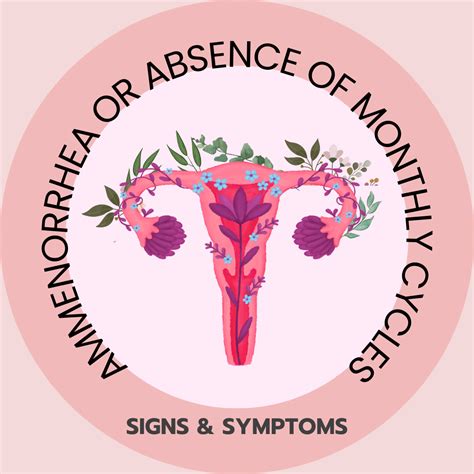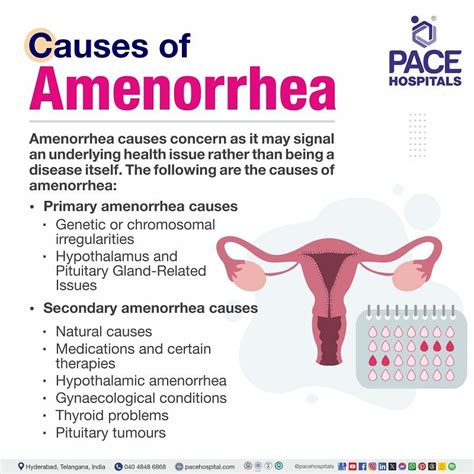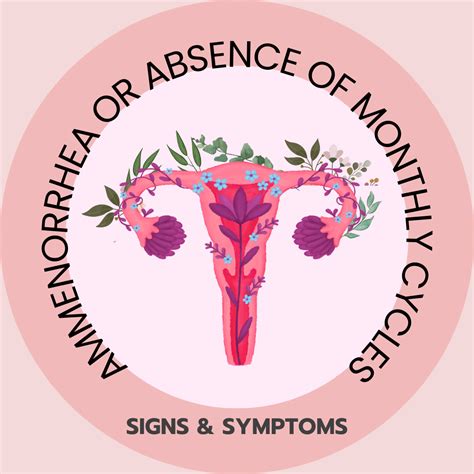Intro
Discover the underlying causes of missed menstrual periods, including hormonal imbalance, pregnancy, and lifestyle factors, to better understand amenorrhea, irregular periods, and female reproductive health.
Missed menstrual periods, also known as amenorrhea, can be a source of concern for many women. The menstrual cycle is a complex process that involves the interplay of various hormones, and any disruption in this process can lead to irregularities in menstrual bleeding. Understanding the causes of missed menstrual periods is essential to identifying the underlying issue and seeking appropriate treatment. In this article, we will delve into the various reasons why women may experience missed menstrual periods, exploring the physical, emotional, and lifestyle factors that can contribute to this condition.
The menstrual cycle is a vital aspect of a woman's reproductive health, and any irregularities in this cycle can have significant consequences. Missed menstrual periods can be a symptom of an underlying medical condition, and it is essential to seek medical attention if a woman experiences persistent or recurrent amenorrhea. The causes of missed menstrual periods can be broadly categorized into physical, emotional, and lifestyle factors. Physical factors include medical conditions such as polycystic ovary syndrome (PCOS), thyroid disorders, and pituitary tumors, while emotional factors include stress, anxiety, and depression. Lifestyle factors, such as weight changes, exercise, and nutrition, can also impact menstrual regularity.
The impact of missed menstrual periods on a woman's overall health and well-being cannot be overstated. Irregular menstrual bleeding can lead to infertility, osteoporosis, and an increased risk of heart disease. Furthermore, the emotional and psychological effects of missed menstrual periods should not be underestimated, as women may experience anxiety, depression, and low self-esteem. It is essential to address the underlying causes of missed menstrual periods to prevent long-term complications and promote overall reproductive health. By understanding the various causes of missed menstrual periods, women can take proactive steps to maintain a healthy menstrual cycle and reduce the risk of associated health problems.
Physical Causes Of Missed Menstrual Periods

Other physical causes of missed menstrual periods include premature ovarian failure, uterine abnormalities, and pelvic inflammatory disease. Premature ovarian failure, also known as premature menopause, occurs when the ovaries stop producing eggs, leading to amenorrhea. Uterine abnormalities, such as a septate uterus or unicornuate uterus, can also cause irregular menstrual bleeding. Pelvic inflammatory disease, a bacterial infection of the reproductive organs, can cause scarring and adhesions, leading to missed menstrual periods.
Polycystic Ovary Syndrome (PCOS)
PCOS is a common endocrine disorder that affects women of childbearing age. The exact cause of PCOS is unknown, but it is thought to be related to insulin resistance, genetic factors, and hormonal imbalances. Women with PCOS may experience irregular menstrual bleeding, weight gain, acne, and excess hair growth. Treatment for PCOS typically involves hormone therapy, such as birth control pills or anti-androgen medications, to regulate menstrual bleeding and reduce androgen levels.Thyroid Disorders
Thyroid disorders, such as hypothyroidism or hyperthyroidism, can disrupt menstrual regularity. The thyroid gland plays a crucial role in regulating menstrual function, and any imbalance in thyroid hormones can lead to amenorrhea. Hypothyroidism, or an underactive thyroid gland, can cause heavy or irregular menstrual bleeding, while hyperthyroidism, or an overactive thyroid gland, can cause light or infrequent menstrual bleeding. Treatment for thyroid disorders typically involves hormone replacement therapy to regulate thyroid function and promote menstrual regularity.Emotional Causes Of Missed Menstrual Periods

Other emotional causes of missed menstrual periods include eating disorders, such as anorexia nervosa or bulimia nervosa, and emotional trauma, such as physical or sexual abuse. Eating disorders can disrupt menstrual regularity, as severe weight loss or gain can impact hormone production. Emotional trauma can also affect menstrual function, as the stress and anxiety associated with trauma can disrupt the balance of hormones in the body.
Stress And Anxiety
Stress and anxiety can have a significant impact on menstrual regularity. When a woman experiences stress, her body produces stress hormones, such as cortisol and adrenaline, which can disrupt the balance of hormones in the body. This can lead to irregular menstrual bleeding, as the stress hormones can affect the production of estrogen and progesterone. Treatment for stress-related amenorrhea typically involves stress management techniques, such as meditation, yoga, or cognitive-behavioral therapy, to reduce stress and promote menstrual regularity.Depression
Depression can also impact menstrual regularity, as this condition can affect the HPA axis, which regulates menstrual function. Women with depression may experience changes in appetite, sleep patterns, and energy levels, which can disrupt menstrual bleeding. Treatment for depression-related amenorrhea typically involves antidepressant medication, such as selective serotonin reuptake inhibitors (SSRIs), to regulate mood and promote menstrual regularity.Lifestyle Causes Of Missed Menstrual Periods

Other lifestyle causes of missed menstrual periods include travel, shift work, and certain medications. Travel, particularly across time zones, can disrupt menstrual regularity, as the change in environment and routine can affect hormone production. Shift work, such as working at night or rotating shifts, can also impact menstrual function, as the disruption in circadian rhythms can affect hormone production. Certain medications, such as antidepressants, antipsychotics, and blood pressure medications, can also cause amenorrhea, as these medications can affect hormone production and menstrual function.
Weight Changes
Significant weight changes can disrupt menstrual function, as changes in body weight can affect hormone production. Weight gain, particularly in the abdominal area, can lead to insulin resistance and hormonal imbalances, which can cause amenorrhea. Weight loss, particularly if it is rapid or excessive, can also disrupt menstrual function, as this can lead to changes in hormone production and menstrual regularity. Treatment for weight-related amenorrhea typically involves a healthy diet and regular exercise to promote weight loss and improve insulin sensitivity.Exercise
Exercise, particularly intense or excessive exercise, can impact menstrual regularity. Exercise can lead to changes in hormone production and menstrual function, particularly if it is intense or excessive. Women who engage in intense exercise, such as marathon running or triathlon training, may experience amenorrhea, as the physical stress of exercise can disrupt hormone production. Treatment for exercise-related amenorrhea typically involves reducing the intensity or frequency of exercise to promote menstrual regularity.What are the common causes of missed menstrual periods?
+Common causes of missed menstrual periods include physical factors, such as polycystic ovary syndrome (PCOS), thyroid disorders, and pituitary tumors, as well as emotional factors, such as stress, anxiety, and depression, and lifestyle factors, such as weight changes, exercise, and nutrition.
How can I diagnose the cause of my missed menstrual periods?
+To diagnose the cause of missed menstrual periods, it is essential to consult a healthcare provider, who will perform a physical examination, take a medical history, and order laboratory tests, such as hormone level tests or imaging studies, to determine the underlying cause of amenorrhea.
What are the treatment options for missed menstrual periods?
+Treatment options for missed menstrual periods depend on the underlying cause and may include hormone therapy, such as birth control pills or anti-androgen medications, stress management techniques, such as meditation or yoga, and lifestyle changes, such as a healthy diet and regular exercise.
In conclusion, missed menstrual periods can be a complex and multifaceted issue, with various physical, emotional, and lifestyle factors contributing to this condition. By understanding the underlying causes of amenorrhea, women can take proactive steps to maintain a healthy menstrual cycle and reduce the risk of associated health problems. If you are experiencing missed menstrual periods, it is essential to consult a healthcare provider to determine the underlying cause and develop an effective treatment plan. We encourage you to share your thoughts and experiences with missed menstrual periods in the comments section below and to share this article with others who may be experiencing similar issues.
